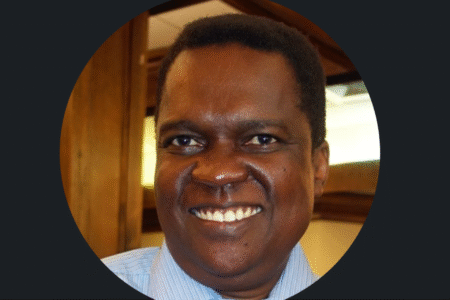Green Success Stories puts Kelsey Alexander, Sustainability Manager at RE Tech Advisors, in the Green Spotlight. We discussed her journey from sustainable agriculture and providing food to people without access, through her efforts to helping with sustainability in the built environment, particularly with holistic ESG strategy and implementation for global real estate funds. Noting that the built environment accounts for 40% of greenhouse gas emissions globally – the shelter we need is destroying the planet that shelters us – Kelsey calls for a systemic integrated approach to achieve sustainability in the industry, with supporting real estate funds right now in improving their ESG performance being of paramount importance.

Tell us a bit about your sustainability journey.
My sustainability journey started in sustainable agriculture and societal impact and transitioned into the sustainable built environment and system thinking.
I was introduced to the world of sustainability in high school when I began an internship with The Nashville Food Project – a non-profit that focused on urban agriculture and providing healthy meals to people without access. I was about to start my senior year and still learning about who I was and who I wanted to be. I never imagined that I would look forward to spending all day with my hands in the dirt, pulling weeds, and turning compost. I would come home daily and tell my family all the new facts I had learned about honeybees, drip irrigation, or recipes with vegetables from the community garden. I immediately signed up for the fledgling environmental science class in my high school and quickly fell in love with the study of our planet.
After I earned my undergraduate degree in environmental science, I slowly entered the field of ESG reporting for private investment funds that had started thinking about their holistic ESG strategy. I admired that these companies were responding to voluntary frameworks – they were choosing to show their investors the impact sustainability was having on their funds’ performances. While completing my master’s degree, I shifted to RE Tech Advisors, a sustainability women-led advisory company where my role allowed me to focus on holistic ESG strategy and implementation for global real estate funds.
Tell us a bit about the product or solution you offer.
The built environment actually accounts for 40% of greenhouse gas emissions globally. It’s so sad to think about how the shelter we need is destroying the planet that shelters us. This is why I decided to dedicate my work to helping real estate investment funds incorporate sustainability into their long-term plans and achieve measurable outcomes.
You can’t mitigate what you don’t measure, and so my first step is helping clients start measuring their energy and water using the EPA’s tool ENERGY STAR Portfolio Manager to help establish a baseline. Once clients are able to set ESG goals and targets, I help the clients consider the tools at their disposal to reduce their impact on the environment and reach their goals. Companies have a variety of ways to improve their utility usage, and I help clients implement data strategies, analyze their quarterly and annual utility performance, and then use that data to report on annual ESG performance to investors through various frameworks such as GRESB, GRI, and SFDR.
Share a green success story with us – how have you helped customers or other businesses in the fight against climate change?
Sustainability cannot be achieved in isolation. Internal and external multi-stakeholder collaboration is a prerequisite to the sustainability journey. Real estate is known for its decentralized ecosystem, but there needs to be a systemic integrated approach to achieve sustainability in this industry. For this reason, supporting real estate funds right now in improving their ESG performance is particularly critical.
Sustainability means transparency. In 2022, I worked with a global investment management company to increase their utility data coverage and improve their performance in GRESB, which is an annual report that many stakeholders use as an initial indicator on a client’s ESG performance. A high score is key for most clients, however it’s difficult for clients to increase their GRESB score as the expectations for transparency begin increasing and the competition continues to improve their performance.
This year, I assisted a client with submitting to GRESB, where they were able to increase their data coverage by 10% and still achieve a 2.6% reduction in energy usage. The fund is focusing on data coverage, increasing transparency, and still achieving utility reductions to meet their sustainability goals.
Sustainability also means data accuracy. Recently, I helped a client map each of their meters to achieve an ambitious target to increase the transparency of their Scope 1, 2, and 3 emissions data. After COP 28, the 2023 UN Climate Change Conference, it became obvious that we are not reducing our greenhouse gas emissions quickly enough to meet the goals from the Paris Agreement. To help this client improve their reductions, I reached out to the property teams to discern whether a meter tracked tenant data, common area, or whole building data and used historical information to break each meter down to Scope 1, 2, or 3. I was able to see how very granular data can impact the overall strategy of a global real estate corporation and reduce any threat of greenwashing.
What would you do with $1 billion dollars?
I would immediately start investing in smart and sustainable infrastructure. I live in Nashville, TN, and this city is growing rapidly in such a short amount of time. I would invest heavily in local public transportation that would allow the city to grow while still saying connected.
In Music City, there are countless music events every week. When a stadium of 20,000 people lets out, people have the option of waiting over an hour to even get a ride through rideshare, or they have to wait over an hour to even get out of their parking lot. Nashville was also recently ranked one of the hardest commutes in the country, but the city can’t receive federal funding because there’s no dedicated local funding for transportation. I would contribute to expanding bus routes, increasing the amount of time buses run, and establishing a light rail city within city limits. I would also focus on establishing a bullet train between Nashville and Atlanta to help encourage the city and the area’s growth. An increase in public transportation could reduce the amount of time it takes people to get in and out of downtown, increase event attendance, and allow people to get around a growing city without growing inconvenience.
At the federal level, I would focus on connecting the United States’ utility grid. Some parts of the grid already operate with high levels of wind and solar generation, but since the U.S. electric grid is so disconnected, it’s difficult to transport renewable energy across the country. It’s almost like if you had a landline in California that was unable to call another landline in New York. I would also put funds towards increasing the amount of renewable energy that the utility grids rely on.
What do you envision your industry looking like in ten years?
As time goes on, the demand for climate accountability grows exponentially. There are emerging regulations and frameworks across the U.S. and Europe that will require companies to disclose their sustainability performance annually, almost like standardized testing in grade school. The investors are like the school board, wanting to see how highly their students are performing. Corporate sustainability is only going to become more important as investors request greenhouse gas emissions, community impact, and company goals. In the U.S. alone, 60% of investors said they would pay a premium for targets with high levels of ESG maturity.
Besides growing investor inquiries, ESG increases the longevity of a building’s lifespan. There’s also greater revenue generation through improved efficiencies, reduced utility usage, and a decreased climate risk for properties. To achieve these benefits, real estate companies need to start tracking their utility data now so that they can identify the areas that need improvement and begin taking the necessary next steps to mitigate their impact on climate change. I believe sustainability consultants will only become more in demand as time goes on, and people need to rely on their insights and array of resources to improve their businesses and increase their ESG transparency.
What would you like readers to take away from this article?
Sustainability is not a job that can be done alone because there are so many components and factors to consider. If you are working on a sustainability project, start with data, create a baseline, and then set goals. Encourage the companies you like or work with to be more transparent, report on their sustainability performance, and hold them accountable.
How should readers get in touch with you and/or your organization?
Readers can feel free to reach out to me on LinkedIn: https://www.linkedin.com/in/kelsey-alexander-0bb89211a/
Kudos
Many thanks to Kelsey Alexander and RE Tech Advisors. Green Success Stories is happy to support and highlight your efforts! We invite you the reader to do the same.
About Green Success Stories
Green Success Stories is a media platform that highlights leaders in sustainability and climate tech.
We offer professional writing (articles, blogposts, case studies, and more) combined with social media promotion. You get great content + exponential publicity. As a starting offer, we’d like to feature you and your organization in a FREE PROFILE ARTICLE. There’s no obligation, but we’d appreciate you considering our services. Let us know if you’re interested and we’ll share more information.
Support Green Success Stories
Like what we’re doing? Please pitch in and help us highlight leaders in the fight against global warming.
Thanks!





